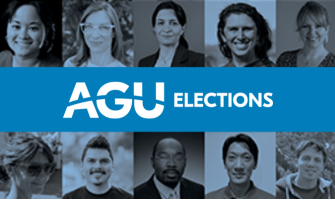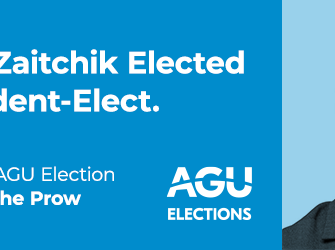A Growing Threat to Academic Freedom
UPDATE (3 December, 5:10 P.M. EST): In a new letter to Commerce Secretary Pritzker, Chairman Smith stated, “In order to move the Committee’s work forward…the Committee is willing to accommodate NOAA and prioritize communications sent and received by non-scientific personnel…However, this prioritization does not alleviate NOAA’s obligation to respond fully to the Committee’s subpoena.” Read The Washington Post article.
In response, AGU Executive Director/CEO Christine McEntee responded, “For now, House Science Committee Chairman Lamar Smith has shifted his focus from demanding emails sent and received by scientists at NOAA to insisting on only communications sent and received by agency non-scientists. Whether he took this step of his own accord or in response to the letter from AAAS, AGU and other scientific associations or the letter from NOAA Administrator Sullivan, this is a step in the right direction. I nevertheless remain concerned, both because the communications of the non-scientists could include some of the scientific deliberations related to the study in question, and because Chairman Smith stated in his letter that NOAA is still required at some point in the future to provide the scientists’ communications. We will continue to monitor the situation and will respond again if necessary.”
UPDATE (24 November, 5:30 P.M. EST): AGU has signed a joint letter to Chairman Smith with several other science societies expressing concerns about the inquiry into NOAA’s scientific processes.
UPDATE (24 November, 10:20 A.M. EST): In the National Journal article, Scientists Warn Congressional Probe Will Chill Research, AGU Executive Director/CEO Christine McEntee was quoted saying, “What we think is at stake here is the integrity of the scientific process and the ability of scientists to conduct their work free of reprisal.”
UPDATE (20 November, 2:15 P.M. EST): Eddie Bernice Johnson (D-Tex.), ranking Democrat on the House Committee on Science, Space and Technology, issued a letter yesterday, 19 December, to committee Chairman Lamar Smith in response to his communications with NOAA and Commerce Secretary Penny Pritzker.
UPDATE (19 November, 1:17 P.M. EST): Lamar Smith (R-Tex.), Chairman of the House Committee on Science, Space and Technology, issued a second letter yesterday, 18 November, to Commerce Secretary Penny Pritzker demanding compliance with the original subpoena.
Earlier this spring, I wrote a post about AGU’s strong support for academic freedom. I talked about the fact that the responsibility scientists have to be transparent about their work goes hand-in-hand with the right they have to be free from intrusive disclosure requirements related to their private communications and/or interference based on someone else’s interpretations of their scientific research. That post was prompted by a letter sent from a member of Congress to seven academic institutions demanding more information about funding sources and access to personal communications.
Unfortunately, I am compelled once again to assert the importance of scientists’ right to be free from political intimidation. In this case, House Science, Space and Technology Committee Chairman Lamar Smith (R-TX) has issued a subpoena to NOAA demanding the emails, correspondence and other records of internal data from agency scientists stemming from an article the scientists published in the journal Science. The article focused on updating global temperature data sets using current readings and analysis, and refuted the concept that there has been a “pause” in global warming.
Chairman Smith originally sent a letter requesting both the original data the authors used, as well as private communications. When NOAA provided the data, but not the more private information, Chairman Smith issued the subpoena. He has also since issued a letter to NOAA Administrator Kathryn Sullivan demanding that she turn over the documents by this past Friday, 13 November, or be exposed to “civil and/or criminal enforcement mechanisms.”
To date, NOAA has not agreed to the Congressman’s demands, and we don’t know what Chairman Smith’s response was/will be.
The idea that scientists could face legal and possibly even criminal consequences because of the content of their work is dismaying to say the least. Not only could these scientists be at risk, so could the federally-supported research of one of our premier science agencies. In particular, it could mean that the internal deliberations and communications between the research team, as well as their communications and consultations with other scientists outside of their team, could no longer be free and open. As such, this incident is, quite literally, a direct challenge to the scientific process. It threatens the ability of the many scientists at federal agencies to engage in vigorous and free discussions with other scientists worldwide, including the kind of collaboration needed to produce the best science and to be able to offer the best scientific advice to our government.
Already, one of our sister societies, the American Meteorological Society, has issued a letter directly to Chairman Smith expressing concern over his subpoena and asking him to trust and support the peer review process’s assessment of NOAA research. AGU is having conversations about this issue with other scientific societies as well, including AAAS, and assessing what further steps might be required. We will keep you informed as those decisions are made.
In the meantime, I welcome your thoughts about what else AGU can or should do to start to rein in this growing threat to academic freedom.






AMS was strong and fast on this issue. I’m sorry AGU has, so far, still not sent a formal letter. Please do so. The efforts of Chairman Smith are inexcusable, reprehensible, and without merit.
See the joint letter to Chairman Smith that AGU has signed on to with several other science societies expressing concerns about the inquiry into NOAA’s scientific processes: https://sciencepolicy.agu.org/files/2013/07/Intersociety-NOAA-letter-11-24-2015.pdf.
Count me as fully in support of Rep. Lamar Smith (R – Texas). The 2009 “Climategate” affair at the University of East Anglia, U.K. was bad enough. The NOAA, NASA, EPA, and all government agencies should hold themselves out to the highest state of transparency. By dodging the request, it merely furthers the distrust the American people have of their government agencies. I am particularly concerned when hidden political interests, not open scientific debates, intrude on significant policy matters. In his 1961 Farewell Address, President Eisenhower gave us the term “Military Industrial Complex”. He also gravely warned of the corruption of science by government funding. I share his concern.
Scientists are certain that humans are warming the planet, primarily due to the burning of fossil fuels which emits heat-trapping gases such as carbon dioxide. Health officials, insurers, and military experts also agree that continued warming poses great dangers to society and to the environment.
“Thermometers” in the air, on land, in the oceans, and in ice all show a warming trend as expected due to the physics of greenhouse gases. There are no known natural causes of climate change that can result in the pattern of warming occurring but this heat-trapping pattern matches what is expected due to greenhouse warming.
The data to support this warming is, and has been, publicly available to all who wish to analyze. The scientific peer review process is not perfect but over time the best science rises to the top. Rep. Smith would be wise to heed the warning from our science, health, military, and insurance experts that we must accept the science and begin to roll up our sleeves and solve the problem. Harassing scientists might appear to appeal to his political base, but it does not help any of us in the long run. Delay means inaction and inaction means more pain and suffering, ultimately leading to greater government involvement and higher costs. The sooner we act, the easier it will be for free market solutions and individuals will be able to make their own choices. Delay works against a fiscal conservative’s own interests.
Now, let us all sit at the table and argue about solutions instead of whether or not there is a problem and let our scientists do their jobs unfettered from politics.